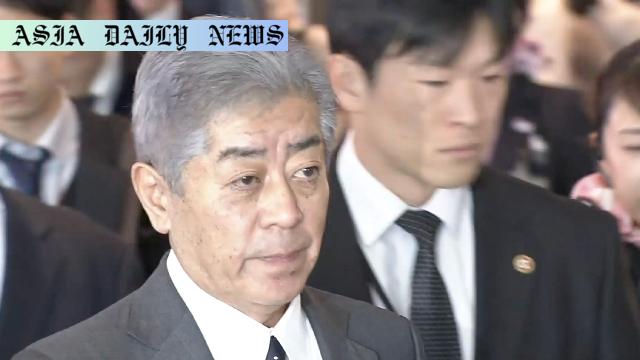Russia Entry Ban: Moscow indefinitely bans Japanese officials and business leaders in response to Ukraine-related sanctions.

Introduction: Russia’s Diplomatic Retaliation
Russia has escalated its diplomatic confrontation with Japan by indefinitely banning nine Japanese citizens from entering the country. This recent wave of restrictions includes notable figures such as Japan’s Foreign Minister Iwaya Takeshi, prominent diplomats, and influential business leaders. The Russian Foreign Ministry announced this action on Monday as a direct countermeasure to sanctions implemented by Japan in response to Moscow’s widely criticized military operations in Ukraine, which Russia continues to refer to as a “special military operation.”
Expanding Tensions: Who’s on the Ban List?
The entry ban encompasses a diverse group of individuals from Japan’s political, diplomatic, and corporate spheres. High-ranking officials such as Nakagome Masashi, the Japanese Ambassador to Ukraine, and Matsuda Kuninori, the former ambassador, are highlighted on the list. However, the bans are not limited to politicians or state officials. Key figures from the private sector, like the presidents of engineering giant IHI and Isuzu Motors, have also been included. This targeted move underscores the breadth and seriousness of Russia’s counter-response to Japan’s sanctions.
Historical Context: A Pattern of Diplomatic Sanctions
This is not the first time Russia has implemented sanctions on Japanese citizens. Since the commencement of its military intervention in Ukraine, Moscow has already prohibited entry to 460 Japanese individuals. These prior bans have notably included Japanese Prime Minister Ishiba Shigeru and a host of lawmakers, business figures, and other significant personalities. The current additions to the list reflect Moscow’s ongoing strategy to respond proportionally—or in its view, reciprocally—to international sanctions.
Major Implications for Japan-Russia Relations
The ramifications of this entry ban go beyond individual restrictions and touch upon the broader diplomatic relationship between Japan and Russia. The tension has effectively strained bilateral ties, especially in light of Japan’s vocal criticism of Russia’s actions in Ukraine. Japan has aligned itself with other G7 nations in condemning Moscow’s moves, imposing sanctions that target Russian economic interests, its international standing, and specific individuals. Such tit-for-tat actions further erode any potential for meaningful diplomatic engagement between the two nations, at least in the immediate future.
Economic and Corporate Fallout
The inclusion of top executives from corporations like IHI and Isuzu Motors on the ban list signals a widening of Russia’s strategy, directly impacting business leaders who hold sway in economic and industrial sectors. As Japan is a significant economic player globally, such bans may have ripple effects on the dynamics of international trade and industry collaboration, particularly in sectors where Japanese companies maintain a strong influence. The move also complicates the relationship for businesses that must navigate the geopolitical complexities of doing business with and within Russia.
Conclusion: An Intensifying Standoff
As the conflict in Ukraine continues unresolved, Russia’s reciprocal actions against nations supporting Ukraine with sanctions or aid are becoming increasingly aggressive. Japan’s inclusion in the broader geopolitical dispute highlights the global dimensions of this conflict and what is at stake for countries that position themselves against Moscow. With both nations holding firm in their respective stances, finding common ground appears less likely, and the entry bans serve as another symbolic but impactful layer of the ongoing diplomatic struggle.
Commentary
Introduction: A Case of Reciprocal Diplomacy
Russia’s decision to impose fresh entry bans on high-ranking Japanese officials and business leaders is indicative of the increasingly strained relations between the two nations. These bans, proclaimed as countermeasures against Japan’s sanctions, demonstrate the extent to which geopolitical disagreements over Ukraine have rippled across the Asia-Pacific. For Russia, such a stance reinforces its message to the international community: Moscow will retaliate against those it perceives as adversaries without hesitation.
The Strategic Implications of Russia’s Move
Strategically, these entry bans appear symbolic yet far-reaching. While it is unlikely that the individuals on the list frequently visit Russia, the implications of such moves are more substantial than they seem. By targeting individuals of economic and political importance, Russia sends a clear message to Japan about the potential consequences of continuing its alignment with Western powers. It also discourages deeper Japanese involvement in counter-Russian coalitions, including its contribution to Ukraine’s defense.
Broader Regional and Global Dynamics
Looking at the larger picture, this diplomatic tit-for-tat underscores how the conflict in Ukraine has transformed into a global political tug-of-war, extending beyond Europe. For Japan, this situation places it in a delicate position as it balances its regional and global interests. As a member of the G7, Japan is expected to uphold collective international opposition to Russia’s actions. However, its geographical proximity to Russia and its vested economic ties make it a complex participant in the alliance.
The Future of Japan-Russia Relations
Based on current trends, it is difficult to envision a thaw in relations between Moscow and Tokyo in the foreseeable future. The consistent reciprocation of punitive actions belies any possibility of constructive dialogue. Both sides risk deeper isolation in their diplomatic dealings, and in Japan’s case, it will likely reinforce its partnerships with Western allies. Meanwhile, Russia will probably continue to seek alternative allies and trade routes, raising questions about how the world order might shift as a result of such growing divisions.


